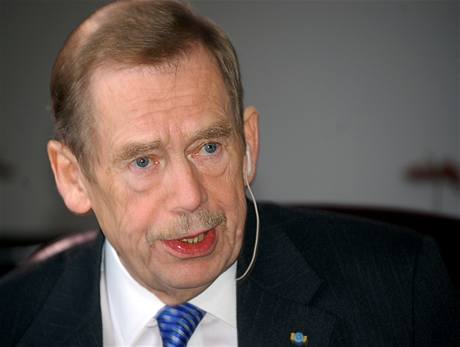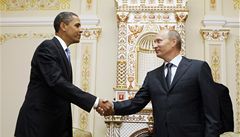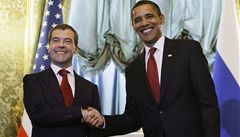"Od konce studené války uplynulo dvacet let a my vidíme, že zabývat se zeměmi střední a východní Evropy již není jádrem americké zahraniční politiky. Obamova administrativa si stanovila své priority a o náš region se přestala téměř zajímat." Těmito slovy začíná jeden z prvních odstavců otevřeného dopisu, který adresovali politici a intelektuálové ze střední a východní Evropy Baracku Obamovi.
Za sestavením dopisu stojí zástupci Česka, Polska, Maďarska, Estonska, Bulharska a dalších nových členských států EU. Cílem jejich snažení je dát Washingtonu najevo, že si tyto země nepřejí, aby jejich region zmizel z popředí amerického zájmu. Zároveň nechtějí, aby zájmy těchto zemí "byly obětovány na oltář dohody s Ruskem".
"Není to nic kritického, chtěli jsme se jen ozvat, že tady jsme. Že ještě není vše doděláno," uvedl pro LN bývalý vicepremiér Alexandr Vondra, který je jedním z organizátorů celé akce. "Pak jsme se rozhodli nabídnout to k podpisu dalším lidem, aby to získalo větší váhu," dodal.
Dopis tak již podepsalo sedm exprezidentů - Valdas Adamkus, Emil Constantinescu, Václav Havel, Michal Kováč, Aleksander Kwasniewski, Lech Walesa a Vaira Vikeová-Freibergová a několik bývalých premiérů či ministrů.
V první části dopisu jeho autoři hodnotí současnou situaci v transatlantických vztazích. Zmiňují zejména, jak na region dopadla finanční krize či loňská rusko-gruzínská válka. "Jsme přesvědčeni, že Amerika potřebuje Evropu a že Evropa potřebuje Ameriku stejně tak nyní jako v minulosti," píší politici.
Velká část dokumentu se týká Ruska. "Naše naděje, že se vztahy s Ruskem zlepší a že Moskva konečně uzná naši suverenitu a nezávislost poté, co jsme se stali členy NATO a EU, se nenaplnily," konstatuje se. Rusko podle autorů dopisu manipuluje s médii a používá i nejrůznější ekonomické zbraně, zejména pokud jde o oblast energetiky.
Radar není proti Rusku a Kreml to ví
A proč dopis právě nyní? Rusko-americké vztahy totiž zažívají "reset". Do Moskvy před pár dny poprvé zavítal Barack Obama, uzavřel zde několik dohod a Moskva to označila jako "první, ale důležitý krok" k oživení spolupráce s USA. Kreml však tehdy neopomněl zkritizovat plány na výstavbu protiraketového štítu ve střední Evropě.
Zatímco Bushova administrativa štít jednoznačně podporovala, Obama se k plánu staví zdrženlivě. A právě protiraketový deštník je také jedním z témat, kterým se dopis zabývá. "Malé množství raket nemůže ohrozit ruské strategické schopnosti a Kreml to ví," píše se vdokumentu.
"Úplné zřeknutí se tohoto programu nebo zapojení Ruska do něj bez konzultací s Polskem a Českou republikou by mohlo podkopat věrohodnost Spojených států v celém regionu," sdělují Obamovi evropští politici.
"Myslím si, že je dobré, ačkoliv mám velkou důvěru v administrativu prezidenta Obamy, upozornit ho na obavy, které v našich končinách existují," uvedl bývalý šéf české diplomacie Karel Schwarzenberg, který dopis také podepsal.
An Open Letter to the Obama Administration from Central and Eastern EuropeWe have written this letter because, as Central and Eastern Europe intellectuals and former policymakers, we care deeply about the future of the trans-Atlantic relationship as well as the future quality of relations between the United States and the countries of our region. We write in our personal capacity as individuals who are friends and allies of the US as well as committed Europeans. Our nations are deeply indebted to the United States. Many of us know firsthand how important your support for our freedom and independence was during the dark Cold War years. US engagement and support was essential for the success of our democratic transitions after the Iron Curtain fell twenty years ago. Without Washington’s vision and leadership, it is doubtful that we would be in NATO and even the EU today. We have worked to reciprocate and make this relationship a two-way street. We are Atlanticist voices within NATO and the EU. Our nations have been engaged alongside the United States in the Balkans, Iraq and today in Afghanistan. While our contribution may at times seem modest compared to your own, it is significant when measured as a percentage of our population and GDP. Having benefited from your support for liberal democracy and liberal values in the past, we have been among your strongest supporters when it comes to promoting democracy and human rights around the world. Twenty years after the end of the Cold War, however, we see that CEE countries are no longer at the heart of American foreign policy. As the new Obama administration sets its foreign-policy priorities, our region is one part of the world that Americans have largely stopped worrying about. Indeed, at times we have the impression that U.S. policy was so successful that many American officials have now concluded that our region is fixed once and for all and that they could "check the box” and move on to other more pressing strategic issues. Relations have been so close that many on both sides assume that the region’s trans-Atlantic orientation, as well as its stability and prosperity, would last forever That view is premature. All is not well either in our region or in the trans-Atlantic relationship. Central and Eastern Europe is at a political crossroads and today there is a growing sense of nervousness in the region. The global economic crisis is impacting on our region and, as elsewhere, runs the risk that our societies will look inward and be less engaged with the outside world. At the same time, storm clouds are starting to gather on the foreign policy horizon. Like you, we await the results of the EU Commission on the origins of the Russo-Georgian war. But the political impact of that war on the region has already been felt. Many countries were deeply disturbed to see the Atlantic alliance stand by as Russia violated the core principles of the Helsinki Final Act, the Charter of Paris, and the territorial integrity of a country that was a member of NATO's Partnership for Peace and the Euro-Atlantic Partnership Council –all in the name of defending a sphere of influence on its borders. Despite the efforts and significant contribution of the new members, NATO today seems weaker than when we joined. In many of our countries it is perceived as less and less relevant – and we feel it. Although we are full members, people question whether NATO would be willing and able to come to our defense in some future crises. Europe’s dependence on Russian energy also creates concern about the cohesion of the Alliance. President Obama’s remark at the recent NATO summit on the need to provide credible defense plans for all Alliance members was welcome, but not sufficient to allay fears about the alliance´s defense readiness. Our ability to continue to sustain public support at home for our contributions to Alliance missions abroad also depends on us being able to show that our own security concerns are being addressed in NATO and close cooperation with the US. We must also recognize that America’s popularity and influence have fallen in many of our countries as well. Public opinions polls, including the German Marshall Fund’s own trans-Atlantic Trends survey, show that our region has not been immune from the wave of criticism and anti-Americanism that has swept Europe in recent years and which led to a collapse in sympathy and support for the United States during the Bush years. Some leaders in the region have paid a political price for their support of the unpopular war in Iraq. In the future they may be more careful in taking political risks to support the United States. We believe that the onset of a new Administration has created a new opening to reverse this trend but it will take time and work on both sides to make up what we have lost. In many ways the EU has become the major factor and institution in our lives. To many people it seems more relevant and important today than the link to the United States. To some degree it is a logical outcome of the integration of Central and Eastern Europe into the EU. Our leaders and officials spend much more time in EU meetings than in consultations with Washington, where they often struggle to attract attention or make our voices heard. The region’s deeper integration in the EU is of course welcome and should not necessarily lead to a weakening of the trans-Atlantic relationship. The hope was that integration of Central and Eastern Europe into the EU would actually strengthen the strategic cooperation between Europe and America. However, there is a danger that instead of being a pro-Atlantic voice in the EU, support for a more global partnership with Washington in the region might wane over time. The region does not have the tradition of assuming a more global role. Some items on the trans-Atlantic agenda such as climate change do not resonate in the Central and East European publics to the same extent as they do in Western Europe. Leadership change is also coming in Central and Eastern Europe. Next to those fewer and fewer leaders who emerged from the revolutions of 1989 and experienced Washington’s key role in securing our democratic transition and anchoring our countries in NATO and EU a new generation of leaders is emerging, who do not have these memories and follow a more "realistic” policy. At the same time, the former-Communist elites, whose insistence on political and economic power significantly contributed to the crises in many CEE countries, gradually disappear from the political scene. The current political and economic turmoil and the fallout from the global economic crisis provide additional opportunities for the forces of nationalism, extremism, populism and anti-Semitism across the continent but also in some our countries. This means that the United States is likely to lose many of its traditional interlocutors in the region. The new elites replacing them may not share the idealism - or have the same relationship to the United States - as the generation who led the democratic transition. They may be more calculating in their support of the United States as well as more parochial in their world view. And in Washington a similar transition is taking place as many of the leaders and personalities we have worked with and relied on are also leaving politics. And then there is the issue of how to deal with Russia. Our hopes that relations with Russia would improve and that Moscow would finally fully accept our full sovereignty and independence after joining NATO and the EU have not been fulfilled. Instead, Russia is back as a revisionist power pursuing a 19th-century agenda with 21st-century tactics and methods. On a global level, Russia has become, on most issues, a status-quo power. But at a regional level and vis-à-vis our nations, it increasingly acts as a revisionist one. It challenges our claims to our own historical experiences. It asserts a privileged position in determining our security choices. It uses overt and covert means of economic warfare, ranging from energy blockades and politically motivated investments to bribery and media manipulation in order to advance its interests and to challenge the trans-Atlantic orientation of Central and Eastern Europe. We welcome the "reset” of the American-Russian relations. As the countries living closest to Russia, obviously nobody has a greater interest in the development of the democracy in Russia and better relations between Moscow and the West than we do. But there is also nervousness in our capitals. We want to ensure that too narrow an understanding of Western interests does not lead to the wrong concessions to Russia. Today the concern is, for example, that the United States and the major European powers might embrace the Medvedev plan for a "Concert of Powers” to replace the continent's existing, value-based security structure. The danger is that Russia's creeping intimidation and influence-peddling in the region could over time lead to a de facto neutralization of the region. There is a spread of views within the region when it comes to Moscow’s new policies. But there is a shared view that is the full engagement of the United States is needed. Many in the region are looking with hope to the Obama Administration to restore the Atlantic relationship as a moral compass for their domestic as well as foreign policies. A strong commitment to common liberal democratic values is essential to our countries. We know from our own historical experience the difference between when the United States stood up for its liberal democratic values and when it did not. Our region suffered when the United States succumbed to "realism” at Yalta. And it benefited when the United States used its power to fight for principle. That was critical during the Cold War and in opening the doors of NATO. Had a "realist” view prevailed in the early 1990s, we would not be in NATO today and the idea of a Europe whole, free and at peace would be a distant dream. We understand the heavy demands on your Administration and on US foreign policy. It is not our intent to add to the list of problems you face. Rather, we want to help by being strong Atlanticist allies in a US-European partnership that is a powerful force for good around the world. But we are not certain where our region will be in five or ten years time given the domestic and foreign policy uncertainties we face. We need to take the right steps now to ensure the strong relationship between the United States and Central and Eastern Europe over the past twenty years will endure. We believe this is a time both the US and Europe need to reinvest in the trans-Atlantic relationship. We also believe this is a time when the US and Central and Eastern Europe must reconnect around a new and forward-looking agenda. While recognizing what has been achieved in the twenty years since the fall of the Iron Curtain, it is time to set a new agenda for close cooperation for the next twenty years across the Atlantic. Therefore, we propose the following steps: First, we are convinced that America needs Europe and that Europe needs the US as much today as in the past. The US should reaffirm its vocation as a European power and make clear that it plans to stay fully engaged on the continent even while it faces the pressing challenges in Afghanistan and Pakistan, the wider Middle East and Asia. For our part we must work at home in our own countries and in Europe more generally to convince our leaders and societies to adopt a more global perspective and be prepared to shoulder more responsibility in partnership with the United States. Second, we need a renaissance of NATO as the most important security link between the US and Europe. It is the only credible hard power security guarantee we have. NATO must reconfirm its core function of collective defense even while we adapt to the new threats of the 21st century. A key factor in our ability to participate in NATO’s expeditionary missions overseas is the belief that we are secure at home. We must therefore correct some self-inflicted wounds from the past. It was a mistake not to commence with proper Article V defense planning for new members after NATO was enlarged. NATO needs to make the Alliance’s commitments credible and provide strategic reassurance to all members. This should include contingency planning, prepositioning of forces, equipment, and supplies for reinforcement in our region in case of crisis as originally envisioned in the NATO-Russia Founding Act. We should also re-think the working of the NATO-Russia Council and return to the practice where NATO member countries enter into dialogue with Moscow with a coordinated position. When it comes to Russia, our experience has been that a more determined and principled policy toward Moscow will not only strengthen the West’s security but will ultimately lead Moscow to follow a more cooperative policy as well. Furthermore, the more secure we feel inside NATO, the easier it will also be for our countries to reach out to engage Moscow on issues of common interest. That is the dual track approach we need and which should be reflected in the new NATO strategic concept. Third the thorniest issue may well be America’s planned missile-defense installations. Here too, there are different views in the region, including among our publics which are divided. Regardless of the military merits of this scheme and what Washington eventually decides to do, the issue has nevertheless also become -- at least in some countries -- a symbol of America’s credibility and commitment to the region. How it is handled could have a significant impact on their future trans-Atlantic orientation. The small number of missiles involved cannot be a threat to Russia's strategic capabilities, and the Kremlin knows this. We should decide the future of the program as allies and based on the strategic plusses and minuses of the different technical and political configurations. They should not allow the issue to be determined by unfounded Russian opposition. Abandoning the program entirely or involving Russia too deeply in it without consulting Poland or the Czech Republic can undermine the credibility of the United States across the whole region. Fourth, we know that NATO alone is not enough. We also want and need more Europe and a better and more strategic US-EU relationship as well. Increasingly our foreign policies are carried out through the European Union – and we support that. We also want a common European foreign and defense policy that is open to close cooperation with the United States. We are the advocates of such a line in the EU. But we need the US to rethink its attitude toward the EU and engage it much more seriously as a strategic partner. We need to bring NATO and the EU closer together and make them work in tandem. We need common NATO and EU strategies not only toward Russia but on a range of other new strategic challenges. Fifth, energy security. The threat to energy supplies can exert an immediate influence on our nations´ political sovereignty also as allies contributing to common decisions in NATO. That is why it must also become a trans-Atlantic priority. Although most of the responsibility for energy security lies within the realm of the EU, the United States also has a role to play. Absent American support, the Baku-Tbilisi-Ceyhan pipeline would never have been built. Energy security must become an integral part of U.S.-European strategic cooperation. Central and East European countries should lobby harder (and with more unity) inside Europe for diversification of the energy mix, suppliers, and transit routes, as well as for tough legal scrutiny of Russia's abuse of its monopoly and cartel-like power inside the EU. But American political support on this will play a crucial role. Similarly, the United States can play an important role in solidifying further its support for the Nabucco pipeline, particularly in using its security relationship with the main transit country, Turkey, as well as the North-South interconnector of Central Europe and LNG terminals in our region. Sixth, we must not neglect the human factor. Our next generations need to get to know each other, too. We have to cherish and protect the multitude of educational, professional, and other networks and friendships that underpin our friendship and alliance. The U.S. visa regime remains an obstacle in this regard. It is absurd that Poland and Romania -- arguably the two biggest and most pro-American states in the CEE region, which are making substantial contributions in Iraq and Afghanistan -- have not yet been brought into the visa waiver program. It is incomprehensible that a critic like the French anti-globalization activist Jose Bove does not require a visa for the United States but former Solidarity activist and Nobel Peace prizewinner Lech Walesa does. This issue will be resolved only if it is made a political priority by the President of the United States. The steps we made together since 1989 are not minor in history. The common successes are the proper foundation for the trans-Atlantic renaissance we need today. This is why we believe that we should also consider the creation of a Legacy Fellowship for young leaders. Twenty years have passed since the revolutions of 1989. That is a whole generation. We need a new generation to renew the trans-Atlantic partnership. A new program should be launched to identify those young leaders on both sides of the Atlantic who can carry forward the trans-Atlantic project we have spent the last two decades building in Central and Eastern Europe. In conclusion, the onset of a new Administration in the US has raised great hopes in our countries for a trans-Atlantic renewal. It is an opportunity we dare not miss. We, the authors of this letter, know firsthand how important the relationship with the United States has been. In the 1990s, a large part of getting Europe right was about getting Central and Eastern Europe right. The engagement of the United States was critical to locking in peace and stability from the Baltics to the Black Sea. Today the goal must be to keep Central and Eastern Europe right as a stable, activist and Atlanticist part of our broader community. That is the key to our success in bringing about the renaissance in the Alliance the Obama Administration has committed itself to work for and which we support. That will require both sides recommitting to and investing in this relationship. But if we do it right, the pay off down the road can be very real By taking the right steps now, we can put it on a new and solid footing for the future. |






